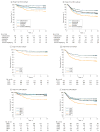Clinical Outcome From Oxaliplatin Treatment in Stage II/III Colon Cancer According to Intrinsic Subtypes: Secondary Analysis of NSABP C-07/NRG Oncology Randomized Clinical Trial
- PMID: 27270348
- PMCID: PMC5065181
- DOI: 10.1001/jamaoncol.2016.2314
Clinical Outcome From Oxaliplatin Treatment in Stage II/III Colon Cancer According to Intrinsic Subtypes: Secondary Analysis of NSABP C-07/NRG Oncology Randomized Clinical Trial
Abstract
Importance: Oxaliplatin added to fluorouracil plus leucovorin therapy for patients with colon cancer has been shown to provide significant but modest absolute benefit for disease-free survival. However, acute and chronic neurotoxic effects from this regimen underscore the need for markers that predict oxaliplatin benefit.
Objective: To test our hypothesis that molecular subtypes of colon cancer would be associated with differential prognosis and benefit from oxaliplatin added to fluorouracil plus leucovorin therapy.
Design, setting, and participants: Participants in the NSABP C-07 trial were divided into discovery (n = 848) and validation (n = 881) cohorts based on the order of tissue block submission. A reestimated centroid using 72 genes was used to determine Colorectal Cancer Assigner subtypes and their association with oxaliplatin benefit in the discovery cohort. The validation cohort was examined with a locked-down algorithm for subtype classification and statistical analysis plan. Post hoc analysis included examination of the entire cohort with Colorectal Cancer Assigner, Colorectal Cancer Subtype (CCS), and Consensus Molecular Subtype (CMS) methods.
Interventions: Fluorouracil plus leucovorin with or without oxaliplatin.
Main outcomes and measures: Percent recurrence-free survival.
Results: Among 1729 patients, 744 (43%) were female and mean (SD) age was 58 (11) years. Although C-07 participants with stage III disease with an enterocyte subtype showed a statistically significant benefit from oxaliplatin in the discovery cohort (hazard ratio, 0.22 [95% CI, 0.09-0.56]; P = .001 [N = 65]), no statistically significant benefit was observed in the validation cohort (hazard ratio, 0.53 [95% CI, 0.22-1.24]; P = .14 [N = 70]). The stemlike subtype was associated with poor prognosis and lack of benefit from oxaliplatin treatment (HR, 0.99 [95% CI, 0.73-1.34]; P = .96 [N = 367]). Examination of the different subtyping methods shows that all 3 methods robustly identified patients with poor prognosis (stemlike, CCS-3, and CMS-4) in both stage II and III.
Conclusions and relevance: Patients with stemlike tumors may be appropriate for clinical trials testing experimental therapies because stemlike tumors were robustly identified and associated with a poor prognosis regardless of stage or chemotherapy regimen. The clinical utility of using subtyping for the identification of patients for treatment with oxaliplatin requires validation in independent clinical trial cohorts.
Trial registration: clinicaltrials.gov Identifier: NCT00004931.
Conflict of interest statement
Disclosures: Dr Yothers has acted in a consulting/advisory role for Pharmacyclics. No other disclosures are reported.
Figures





References
-
- André T, Boni C, Mounedji-Boudiaf L, et al. Multicenter International Study of Oxaliplatin/5-Fluorouracil/Leucovorin in the Adjuvant Treatment of Colon Cancer (MOSAIC) Investigators. Oxaliplatin, fluorouracil, and leucovorin as adjuvant treatment for colon cancer. N Engl J Med. 2004;350(23):2343–2351. - PubMed
-
- Kuebler JP, Wieand HS, O’Connell MJ, et al. Oxaliplatin combined with weekly bolus fluorouracil and leucovorin as surgical adjuvant chemotherapy for stage II and III colon cancer: results from NSABP C-07. J Clin Oncol. 2007;25(16):2198–2204. - PubMed
-
- Cersosimo RJ. Oxaliplatin-associated neuropathy: a review. Ann Pharmacother. 2005;39(1):128–135. - PubMed
-
- Yothers G, O’Connell MJ, Lee M, et al. Validation of the 12-gene colon cancer recurrence score in NSABP C-07 as a predictor of recurrence in patients with stage II and III colon cancer treated with fluorouracil and leucovorin (FU/LV) and FU/LV plus oxaliplatin. J Clin Oncol. 2013;31(36):4512–4519. - PMC - PubMed
Publication types
MeSH terms
Substances
Associated data
Grants and funding
LinkOut - more resources
Full Text Sources
Other Literature Sources
Medical
Research Materials
Miscellaneous

